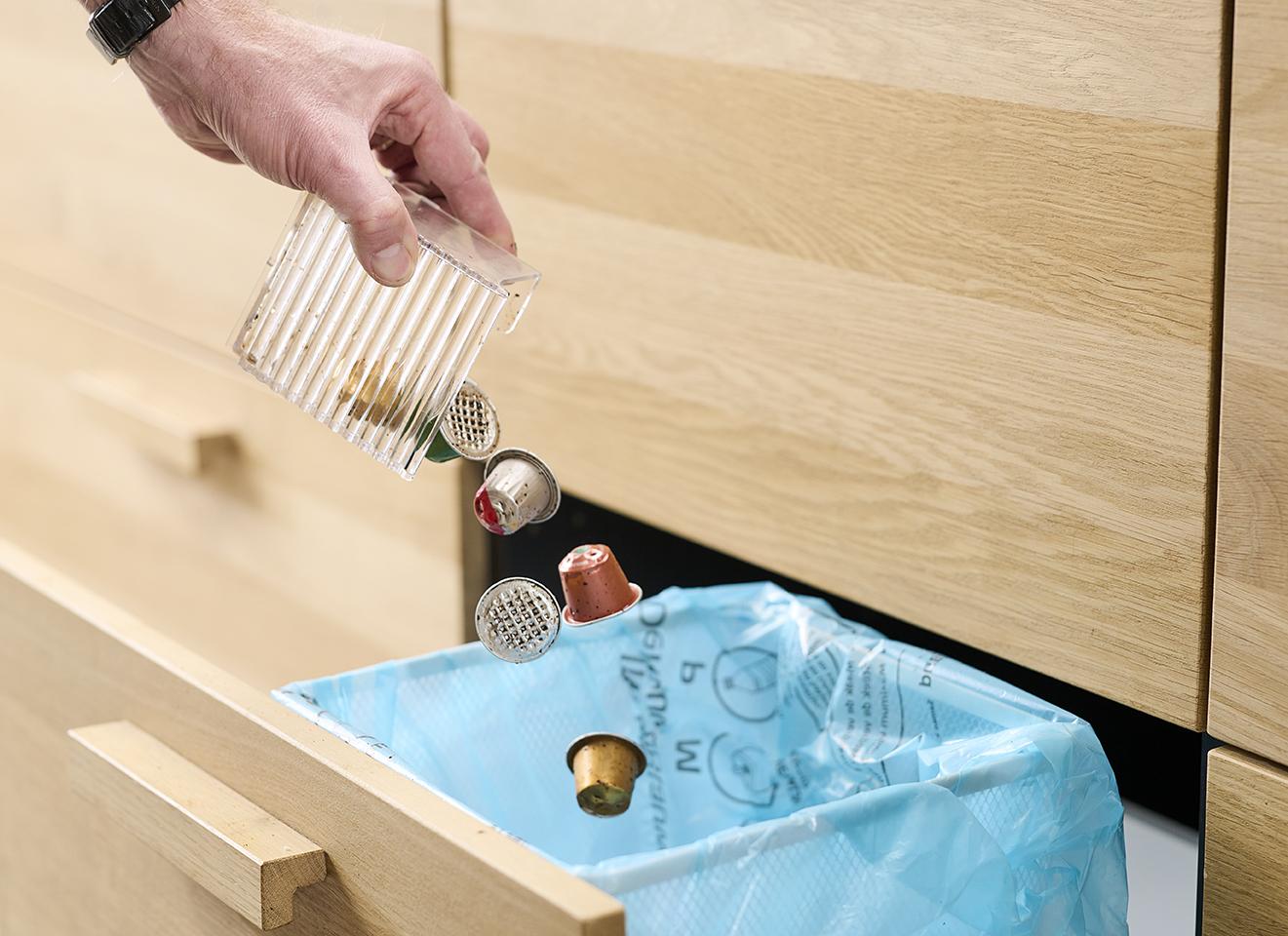
The New Blue Bag
Cornerstone of the Belgian circular economy
Thanks to the New Blue Bag, we collected almost 23 kg of PMD per person per year in 2022. So PMD collection really is at cruising speed now. Behind the scenes, five new sorting centres are in operation and the first advanced recycling facilities are now running at full capacity.
Easy and accessible to everyone
There is no doubt that the blue bag lies behind the success of household packaging recycling in Belgium. Collecting PMD door to door makes the system easy and accessible for everyone and ensured that a maximum amount of packaging was recovered right from the start. By extending the contents to include all plastic packaging – and not just bottles and containers – we are now bringing almost 90,000 tonnes of extra packaging into the circular economy.
Target achieved
The New Blue Bag has now been fully operational for a whole year for the first time. The last intermunicipal company switched to the New Blue Bag at the end of 2021, so the 2022 collection results give us a clear view of the actual yield. And it is exactly in line with expectations. We achieved the targeted results in the first year, with an average of almost 23 kilos per person per year. We expect these results to improve still further in the coming years, as members of the public experience fewer doubts about sorting.
Setting our sights on more expansion
The excellent yield from the New Blue Bag does not, however, mean that we are resting on our laurels. The aim was always to further expand the contents of the blue bag as new sustainable recycling solutions are devised for certain products or packaging. Since the start of 2022, for example, all aerosols have been allowed, unless they fall into the Hazardous Household Waste category. On 1 January 2023, aluminium and plastic capsules for coffee and other drinks were added. We expect to be able to collect another 4,500 tonnes of extra material as a result. And the blue bag will remain open to further expansion in the years to come.

A boost for the Belgian circular economy
Expanding the blue bag has given the circular economy in this country an enormous boost. Funding was provided for five brand-new sorting centres, which are now all up and running. Plus we went in search of local recycling capacity. Successfully: in 2022 two advanced recycling facilities opened as well.
Last sorting centre operational
The contents of the blue bag are sorted in five new sorting centres scattered all over Belgium. This local processing, close to home, means that the PMD bags collected do not have to cover long distances. The sorting centres use state-of-the-art technologies to sort the packaging collected into sixteen uniform material flows. Four of the five sorting centres were already fully operational by the end of 2021: Indaver (Willebroek), Prezero (Evergem), Valtris (Couillet) and Val’Up (Ghlin). The fifth and final sorting centre, Sitel in Engis, came permanently on line in early 2023. Finally, we also have a structural cooperation arrangement with the Vanheede Environment Group sorting centre in Rumbeke to be able to sort additional volumes.
Built-in flexibility yields fruit
The necessary flexibility was built in when the sorting centres were designed so as to constantly further refine the sorting processes. This proved to be a good move. Initially, the contents of the blue bag were sorted into fourteen flows. Another two flows were added last year. Since the start of 2023, opaque PET packaging has been sorted as a separate flow, alongside colourless, blue and coloured PET bottles. For the drinks capsules – which have been allowed with PMD since the start of 2023 – an extra eddy current separator was implemented to pick up small aluminium packaging as well.
New recycling capacity under construction
For further packaging recycling, we opt as much as possible for local processing capacity. A total of five new recycling facilities are to be built to recycle plastic material flows from the blue bag.
In 2020, Ecoo in Houthalen-Helchteren invested in an extra recycling line for mixed plastics and mixed films. In June 2022, Ecoo Beringen opened an ultra-modern facility to recycle polyethylene film, with an annual capacity of 42,000 tonnes of packaging material. The recycled material is used to make new film and bags.
MOPET, a recycling plant in Neufchâteau built by the Dutch company Morssinkhof Rymoplast Group to process complex PET packaging, made an announcement at the beginning of 2022. By the end of 2024, it will be recycling 10,500 tonnes of PET trays and 17,500 tonnes of PET bottles per year, mainly to provide raw materials for new trays and bottles.

Inauguration Ecoo Beringen - Wim Van Den Bossche, CEO of Ecoo group, Ludo Kelchtermans, CEO og Nuhma; Koen Verhaert of Ecoo group; Wim Geens, Managing Director of Fost Plus
At the end of 2022, Filao in Charleroi started bottle-to-bottle recycling of PET bottles. This is a unique, fully circular project that involves recycling PET bottles collected from Belgian families to make raw materials for new bottles which in turn are intended for the Belgian market. This facility is the result of a cooperation between the waste processing company Veolia and Sources ALMA, the Belgian market leader in bottled water. Once it is fully operational, the plant will recycle 40,000 tonnes of PET per year.
Lastly, at the start of 2023 the contract was awarded for the fifth and final recycling centre being built by Morssinkhof Rymoplast in Lommel which, among other things, is to recycle polypropylene and polyethylene packaging.
We will soon be recycling butter tubs and shampoo bottles in Belgium, too
Morssinkhof Rymoplast is building a new recycling plant for plastic packaging from the blue bag in Lommel. The plant will be operational in October 2024 and among other things, will recycle polypropylene (PP) packaging (such as butter tubs and ready-meal trays) and polyethylene packaging (such as shampoo and milk bottles and flasks).


